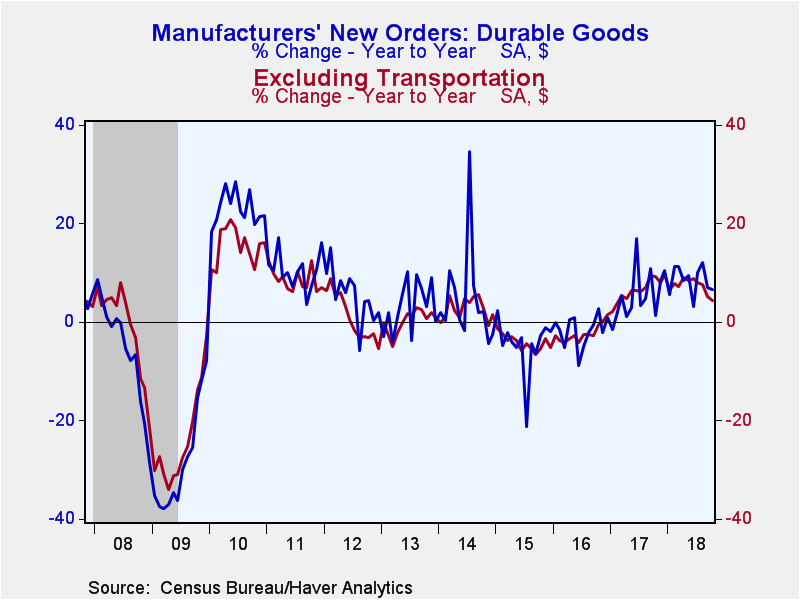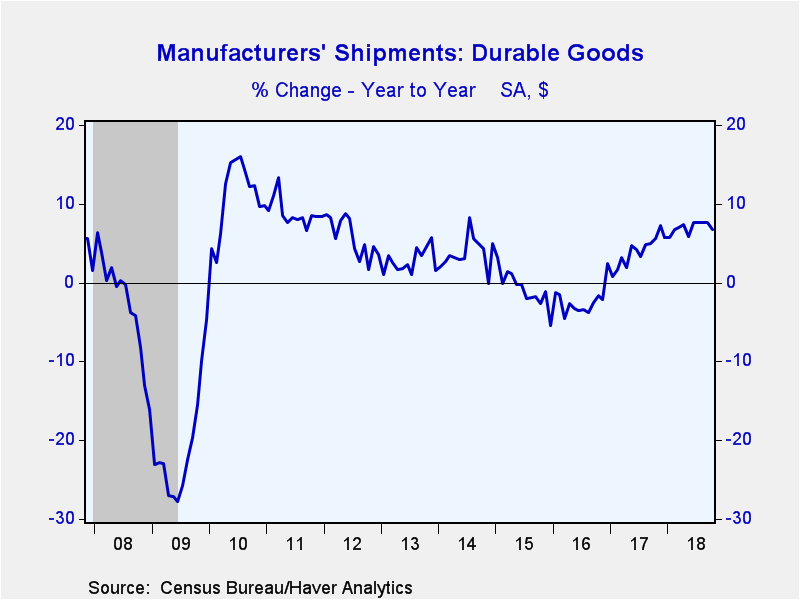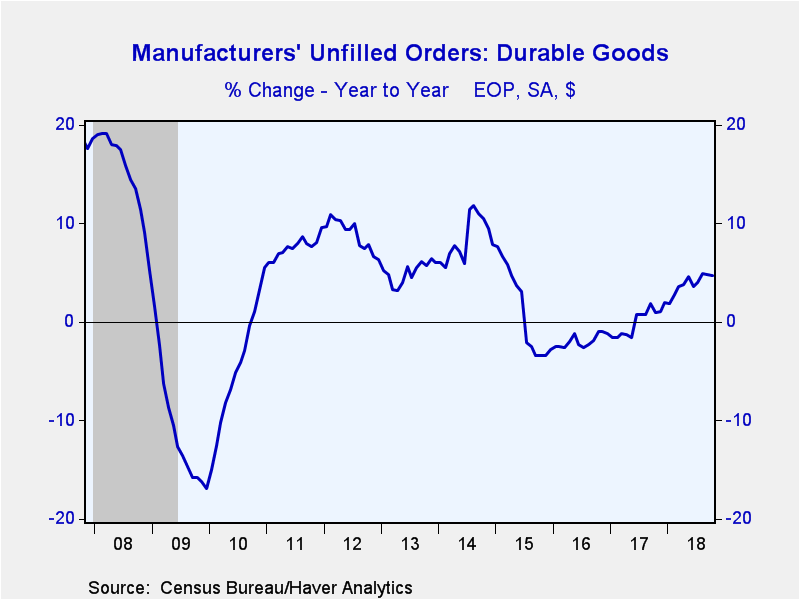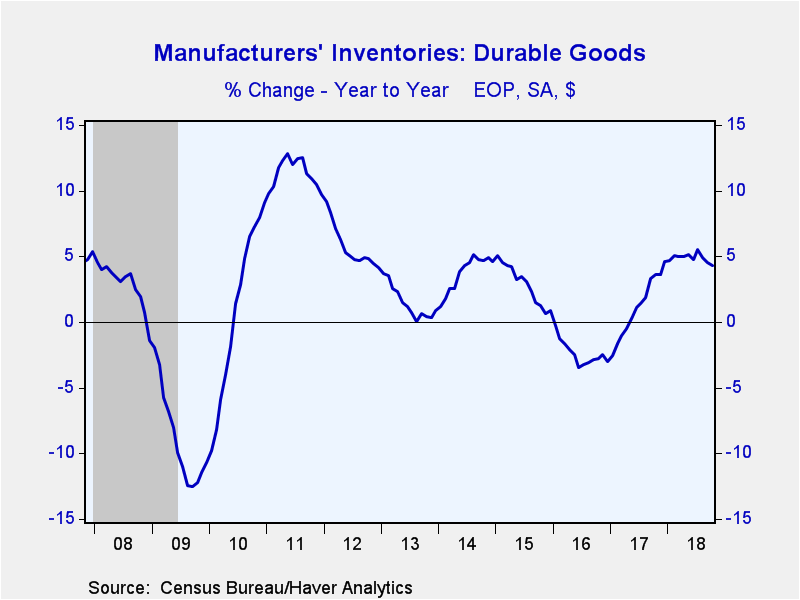 Global| Nov 21 2018
Global| Nov 21 2018U.S. Durable Goods Orders Decline, Led by Aircraft
by:Tom Moeller
|in:Economy in Brief
Summary
Weakness in the durable goods manufacturing sector was evident last month as new orders declined 4.4% (+6.7% y/y) following a 0.1% September dip, revised from a 0.7% increase. The decline outpaced expectations for a 2.7% weakening in [...]
Weakness in the durable goods manufacturing sector was evident last month as new orders declined 4.4% (+6.7% y/y) following a 0.1% September dip, revised from a 0.7% increase. The decline outpaced expectations for a 2.7% weakening in the Action Economics Forecast Survey.
The decline in orders was pronounced in the transportation sector. A 12.2% drop in bookings was led by a 39.0% decline in aircraft & parts orders. It followed strong gains during the prior two months. Defense aircraft orders plummeted 59.3% and reversed the September rise. Nondefense aircraft orders declined 21.4% and have fallen sharply during three of the last four months. Orders for motor vehicles & parts edged 0.2% higher following a 1.1% increase.
Durable goods orders excluding the transportation sector increased minimally in October (4.4% y/y) and have been moving sideways for the last six months. A 3.2% rise (7.1% y/y) in orders for communications equipment was accompanied by a 1.0% increase (2.1% y/y) in orders for computers & related products. Electrical equipment, appliance and component orders rose 2.9% (6.3% y/y) after a 0.8% decline. Fabricated metals orders also were strong and posted a 1.0% rise (5.1% y/y). These gains were countered by a 2.3% decline (+12.5% y/y) in primary metals orders and a 0.5% easing (+1.1% y/y) in machinery orders.
Nondefense capital goods orders fell 4.2% (+2.4% y/y), held back by the decline in aircraft orders. Orders excluding aircraft were little changed after falling for two straight months. Growth during the last twelve months eased to 3.4% compared to a peak 13.3% y/y gain as of September 2017.
Shipments of durable goods eased 0.6% (+6.8% y/y) after a 1.0% rise. Shipments excluding the transportation sector were little changed (5.4% y/y) for the third straight month. Unfilled orders for durable goods eased 0.2% (+4.8% y/y) following a 0.7% gain. Order backlogs excluding the transportation sector rose 0.2% (4.7% y/y), the weakest rise since February. Inventories of durable goods were fairly steady (4.3% y/y) after a 0.8% rise. Inventories excluding the transportation sector eased 0.2% (+5.0% y/y). Year-to-year growth has been slowing here since early this year.
The durable goods figures are available in Haver's USECON database. The Action Economics consensus forecast figure is in the AS1REPNA database.
| Durable Goods NAICS Classification | Oct | Sep | Aug | Oct Y/Y | 2017 | 2016 | 2015 |
|---|---|---|---|---|---|---|---|
| New Orders (SA, % chg) | -4.4 | -0.1 | 4.7 | 6.7 | 5.4 | -1.7 | -5.0 |
| Transportation | -12.2 | 0.9 | 13.3 | 11.2 | 3.4 | -0.7 | -6.3 |
| Total Excluding Transportation | 0.1 | -0.6 | 0.3 | 4.4 | 6.5 | -2.3 | -4.2 |
| Nondefense Capital Goods | -4.2 | -3.1 | 7.4 | 2.4 | 9.1 | -5.8 | -11.8 |
| Excluding Aircraft | -0.0 | -0.5 | -0.2 | 3.4 | 6.7 | -4.5 | -5.5 |
| Shipments | -0.6 | 1.0 | 0.9 | 6.8 | 4.0 | -2.4 | -0.8 |
| Unfilled Orders | -0.2 | 0.7 | 0.9 | 4.8 | 2.0 | -1.2 | -2.7 |
| Inventories | -0.0 | 0.8 | -0.2 | 4.3 | 4.6 | -3.0 | 0.9 |
Tom Moeller
AuthorMore in Author Profile »Prior to joining Haver Analytics in 2000, Mr. Moeller worked as the Economist at Chancellor Capital Management from 1985 to 1999. There, he developed comprehensive economic forecasts and interpreted economic data for equity and fixed income portfolio managers. Also at Chancellor, Mr. Moeller worked as an equity analyst and was responsible for researching and rating companies in the economically sensitive automobile and housing industries for investment in Chancellor’s equity portfolio. Prior to joining Chancellor, Mr. Moeller was an Economist at Citibank from 1979 to 1984. He also analyzed pricing behavior in the metals industry for the Council on Wage and Price Stability in Washington, D.C. In 1999, Mr. Moeller received the award for most accurate forecast from the Forecasters' Club of New York. From 1990 to 1992 he was President of the New York Association for Business Economists. Mr. Moeller earned an M.B.A. in Finance from Fordham University, where he graduated in 1987. He holds a Bachelor of Arts in Economics from George Washington University.
More Economy in Brief
 Global| Feb 05 2026
Global| Feb 05 2026Charts of the Week: Balanced Policy, Resilient Data and AI Narratives
by:Andrew Cates










